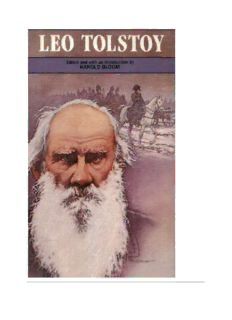
Preview Tolstoy's "Anna Karenina"
Modem Critical Views LEO TOLSTOY Edited with an introduction by Harold Bloom SterlingProfessoroftheHumanitiesYaleUniversity Copyright©1986 ISBN:0877547270 Contents Editor's Note......................................... ix Introduction......Harold Bloom........................ 1 Tolstoyand the Attempts to Go Beyond the Social Forms ofLife......Gyorgy Lukacs................... 9 Goethe and Tolstoy......Thomas Mann.................. 15 Parallels inTolstoy......Viktor Shklovsky................. 49 The GreenTwig and the Black Trunk......Philip Rahv..... 53 Tolstoyand Homer......George Steiner.................. 67 Tolstoyand Enlightenment......IsaiahBerlin............. 75 The Dialectic ofIncarnation: Tolstoy's Anna Karenina......R. P.Blackmur......... 99 Formand Freedom: Tolstoy's Anna Karenina......Barbara Hardy.................. 119 What Is Art?......John Bayley.......................... 141 AManSpeaking to Men: The Narratives of War and Peace......W. Gareth Jones................ 153 The Reader as Voyeur: Tolstoyand the Poetics ofDidactic Fiction......Gary SaulMorson..... 175 Resurrection......Edward Wasiolek....................... 191 Some FatefulPatterns inTolstoy......W. W.Rowe........ 201 Idylland Ideal: Aspects ofSentimentalismin Tolstoy's Family Happiness......NataliaKisseleff....... 211 Symbolismin The Death of IvanIlych Robert Wexelblatt.................................. 221 Tolstoyand the Forms ofLife......Martin Price........... 225 Chronology.......................................... 255 Contributors......................................... 257 Bibliography.......................................... 259 Acknowledgments..................................... 261 Index............................................... 263 Editor's Note Thisvolume gatherstogether arepresentativeselectionofthebestcriticismdevotedtoTolstoythatis availableintheEnglishlanguage.Theessays,reprintedhereinthechronologicalorder oftheir publication,cover a periodfrom1920through1983,andcanbecalleda history-in-littleofthetwentieth- centuryreceptionofTolstoy'sworkinAnglo-Americancriticism,althoughContinentalandRussian commentariesarealsoincludedhere.Theeditor isgratefultoMs.Olga Popov,withoutwhoseerudition hewouldnothaveknownofsome oftheseessays. Theeditor's"Introduction"centersentirelyuponTolstoy's magnificent lateshortnovel HadjiMurad,so astointimatesomethingofTolstoy'sHomericpowersinnarrative.WiththegreatHungariancritic, GyorgyLukacs,weexpecta socialemphasis, butthatemphasisisseverelytestedwhenLukacsadmits thatTolstoytranscendedbothromanticismandtheformofthenovel,andnearlyrenewedtheHomericor nationalepic,arenewalthatLukacsrejectsuponMarxisthistoricalgrounds.ThomasMann,whohad portrayedLukacsinTheMagicMountainasLeoNaphta,theJewishJesuitandNietzscheanterrorist, somewhatcountersLukacsherebycomparingTolstoytoGoethe.AsMannshrewdlynotes, eventhe mostsocialofTolstoy'sconceptsandvisionsinvariablyoriginatedasintensepersonalneeds. Viktor Shklovsky'sbriefexcursusonTolstoyanparallelsprovidesa fineinstanceoftwentieth-century Russianstylisticcriticism.WithPhilipRahv'sruminationsuponTolstoy'sshortnovels,thestartling naturalnessofthatcosmosisemphasized.SomethingofthesametributeispaidbyGeorgeSteiner inhis comparisonofTolstoyandHomer,whichcanbecontrastedusefullytotheeditor'scomparisoninhis introductoryremarks. InIsaiahBerlin's essay,Tolstoyisseenasa martyroftheEuropeanEnlightenment,sacrificingeverything uponthealtaroftruth.Insomesense,thisisparalleltoR.P.Blackmur'sreadingof Anna Karenina, whichconcludesthathumanlifecouldnotstandAnna's"intensity,"perhapsatropefor Tolstoy'sdrive towardstruth.InBarbaraHardy'sverydifferentanalysis,Anna isseenassufferingfromthediseaseof nihilism.WhenJohnBayley,assessingTolstoy'soutrageoustractWhatIsArt?,concludesthat Tolstoy'sanswer is"Myownnovels,"wereceivea wryilluminationuponTolstoyantruthandTolstoyan intensity. WarandPeacebecomesthefocuswiththeexaminationofthatepic novel'svariednarrativesbyW. GarethJones.InGarySaulMorson's essayonthepoeticsofTolstoy's"didacticfiction,"thereisan emphasisinsteaduponthefirstSevastopolstory,asaninstanceoftheoxymoronic elementinalldidactic fiction,evenTolstoy's.WithEdwardWasiolek'sreadingof Resurrection, wearegivena salutary reminder of whatis mostpositiveinTolstoy'sfiction,hisrefusaltodespair.ThisisakintoW.W.Rowe's tracingoffatefulor overdeterminedpatternsinTolstoy,patternsthathisstronger andmoreflexible personagesareabletotranscend. AreadingofFamilyHappiness,byNatalia KisseleffcallsintoquestionTolstoy'spositiveand transcendingtendencies,exposingtheir dangerousnearnesstosentimentalism, whileacknowledgingthat Tolstoyhimselfwasawareofthisunhappyproximity.RobertWexelblattdefinesanapproachtoTolstoy's ultimatetranscendence,themysticalvisionofimmortalityinTheDeathofIvanIlychthrougha comparisonwithKafka'sMetamorphosis. Thisvolume endswithMartinPrice'slucidanalysisof moralcharacter inWarandPeaceandAnna Karenina.Price'sobservationsconfirmTolstoy'sacuityasatragicwriter,adimensionsodifferentfrom theepicheroismofHadjiMuradastorenewour senseof wonder atTolstoy'srange. Introduction WithGodhehasverysuspiciousrelations;theysometimesremindmeoftherelationof"twobearsinone den." —MAXIMGORKY,ReminiscencesofTolstoy I Tolstoy,whileatworkuponhissublimeshortnovel, HadjiMurad,wroteanessayonShakespearein whichhejudgedKingLear,HamletandMacbethtobe"emptyandoffensive."Readingoneofhisfew authenticrivals,Tolstoy"feltanoverpoweringrepugnance,a boundlesstedium."Homer andtheBible wereequalshecouldrecognize,butShakespeareunnervedhim. Thecustomaryexplanationisthat TolstoywasmorallyoffendedbyShakespeare,butthetruthislikelytobedarker. HadjiMuradhasa mimeticforcedifficulttomatchelsewhere.Tofindrepresentationsofthehumanthatcompelustosee realitydifferently,or toseeaspectsofrealityweotherwisecouldnotseeatall,wecanturntoonlya few authors:theYahwistor "J"writer (whomadetheoriginalnarrativesinwhatarenowGenesis,Exodus, Numbers),Homer andDante,Chaucer andShakespeare,CervantesandTolstoyandProust.Ofallthese, Tolstoymostresembles"J."TheartofTolstoy's narrativesnever seemsart,andthenarrativesthemselves movewithanauthoritythatadmitsnoreservations onthereader'sside.GorkywroteofTolstoythat:"He talks mostofGod,ofpeasants,andofwoman.Ofliteraturerarelyandlittle,asthoughliteraturewere somethingalientohim."TheReminiscencesofTolstoyiscontinuallyastonishing,butperhapsmost memorablewhenGorkydescribesTolstoyplayingcards: Howstrangethatheissofondofplayingcards.Heplaysseriously,passionately.Hishandsbecome nervous whenhetakesthecardsup,exactlyashewereholdinglivebirds insteadofinanimatepieces of cardboard. Thatistheauthor ofHadjiMurad,rather thanofWhatisArt?TolstoyholdsHadjiMuradinhishands,as ifindeedheheldtheman,andnota fiction.IreadTolstoyonlyintranslation,andbelievethatImissan immensevalue,butwhatremainsinHadjiMuradoverwhelms meafreshateveryrereading.Tolstoy finishedthenovella inSeptember 1902,shortlyafter hisseventy-fourthbirthday.Perhapsthestorywas hisprofoundstudyof his ownnostalgias,hisreturntohisownyouth,whenhehadparticipatedas a volunteer intheCaucasiancampaign(1851),attheageoftwenty-three,andwhenhewroteTheCossacks (1858,published1863). EverythingoutwardinHadjiMuradishistorical,andTolstoyevidentlywaspreciseandfaithfulin adheringtodocumentedfact,andyettheinwardstoryisaphantasmagoria sopowerfulastodevour and replacewhatever wemightyearntocallreality.HadjiMurad,likeeveryother major figureinthe narrative,wasbotha historicalpersonage,anda livinglegendinTolstoy'stime, yetheisTolstoy's vitalisticvisionatitsmostpersonal,persuasive,andpoignant,beinga visionoftheend.Thatistosay, HadjiMuradisasupremeinstanceofwhattheheroicChernyshevsky,criticandmartyr,praisedas Tolstoy'sprimegifts:purityof moralfeeling,andthesoul'sdialectic,itsantitheticaldiscoursewithitself. PerhapsHadjiMuradcanalsobereadasthereturninTolstoyofthepurestoryteller,whotellshisstory asacontestagainstdeath,soastodefer change,of whichthefinalformmustbedeath.Tolstoy'sruinous meditationsuponthepower ofdeathensuefromhisawesomesenseof life,a vitalityasintenseashisown HadjiMurad's.Hiscrisisinthemid-1870s,whenhewroteAnna Karenina,assetforthinhisConfession (1882),supposedlyturnedupona dreadofnihilism,a convictionthatnomeaningofanylifecouldbe preservedonceitceased.ButTolstoy'sfamousrefusaltodividelifefromliterature,whichcouldleadto theabsurdityofhis"Shakespeare"essay,ledalsotoHadjiMurad. Consider theopeningofthenovella (I givetheAylmer Maudetranslation): Iwasreturninghomebythefields.Itwasmid-summer,thehayharvestwasover andtheywerejust beginningtoreaptherye.Atthatseasonoftheyear thereis a delightfulvarietyofflowers—red,white, andpinkscentedtuftyclover; milkwhiteox-eyedaisies withtheir brightyellowcentresandpleasantspicy smell;yellowhoney-scentedrapeblossoms;tallcampanulaswithwhiteandlilacbells,tulip-shaped; creepingvetch; yellow,red,andpinkscabious;faintlyscented,neatlyarrangedpurpleplantainswith blossomsslightlytingedwithpink;cornflowers,thenewlyopenedblossomsbrightblueinthesunshine butgrowingpaler andredder towardseveningor when growingold;anddelicatealmond-scenteddodder flowersthatwitheredquickly.Igatheredmyselfa largenosegayandwasgoinghome whenInoticedina ditch,infullbloom,a beautifulthistleplantofthecrimsonvariety,whichinour neighborhoodthey call "Tartar"andcarefullyavoidwhenmowing—or,iftheydohappentocutitdown, throwoutfromamongthegrassforfearofprickingtheirhands.Thinkingtopickthisthistleandputitinthecentre ofmynosegay,Iclimbeddownintotheditch,andafterdrivingawayavelvetyhumble-beethathadpenetrateddeep intooneoftheflowersandhadtherefallensweetlyasleep,Isettoworktoplucktheflower.Butthisprovedavery difficulttask.Notonlydidthestalkprickoneveryside—eventhroughthehandkerchiefIhadwrappedroundmy hand—butitwassotoughthatIhadtostrugglewithitfornearlyfiveminutes,breakingthefibresonebyone;and whenIhadatlastpluckedit,thestalkwasallfrayedandthefloweritselfnolongerseemedsofreshandbeautiful. Moreover,owingtoitscoarsenessandstiffness,itdidnotseeminplaceamongthedelicateblossomsofmy nosegay.Ithrewitawayfeelingsorrytohavevainlydestroyedaflowerthatlookedbeautiful initsproperplace. ItdoesnotmatteratallthatthethistleissoobviouslyasynecdocheforHadjiMuradhimself.Whatisatworkhere istheauthorityofTolstoy'sownrecalcitrance.Likethethistle,Tolstoy'sstanceisfirm,rootedintheblack-earth fields."Whatreality!"wethink,aswestareatTolstoy'sfictivecosmos.IfinBalzaceveryjanitorisagenius,in Tolstoyeveryobjectresistsinanimatestatus,beitthe"Tartar"thistleorthelowottomanthatrebelsagainstPeter IvanovichatthebeginningofTheDeathofIvanllych: PeterIvanovichsighedstillmoredeeplyanddespondently,andPraskovyaFedorovnapressedhisarmgratefully. Whentheyreachedthedrawing-room,upholsteredinpinkcretonneandlightedbyadimlamp,theysatdown atthe table—sheonasofaandPeterIvanovichonalowpouffle,thespringsofwhichyieldedspasmodicallyunderhis weight.PraskovyaFedorovnahadbeenonthepointofwarninghimtotakeanotherseat,butfeltthatsuchawarning wasoutofkeepingwithherpresentconditionandsochangedhermind.AshesatdownonthepoufflePeter IvanovichrecalledhowIvanllychhadarrangedthisroomandhadconsultedhimregardingthispinkcretonnewith greenleaves.Thewholeroomwasfulloffurnitureandknick-knacks,andonherwaytothesofathelaceofthe widow'sblackshawlcaughtonthecarvededgeofthetable.PeterIvanovichrosetodetachit,andthespringsofthe pouffle,relievedofhisweight,rosealsoandgavehimapush.Thewidowbegandetachinghershawlherself,and PeterIvanovichagainsatdown,suppressingtherebelliousspringsofthepouffleunderhim.Butthewidowhadnot quitefreedherselfandPeterIvanovichgotupagain,andagainthepoufflerebelledandevencreaked.Whenthiswas allover,shetookoutacleancambrichandkerchiefandbegantoweep.Theepisodewiththeshawlandthestruggle withthepoufflehadcooledPeterIvanovich'semotionsandhesattherewithasullenlookonhisface.Thisawkward situationwasinterruptedbySokolov,IvanIlych'sbutler,whocametoreportthattheplotinthecemeterythat PraskovyaFedorovnahadchosenwouldcost twohundredroubles.Shestoppedweepingand,lookingatPeterIvanovichwiththeairofavictim,remarkedin Frenchthatitwasveryhardforher.PeterIvanovichmadeasilentgesturesignifyinghisfullconvictionthatitmust indeedbeso. Ithasbeenremarkedthatthepouffleorottomanhereismorememorable,hasmorevitality,thanthepersonages haveinmostotherauthors'fiction.OfHadjiMuradIammovedtosaythateverythinginit—people,horses, landscapes—exuberantlyisrammedwithlife.IsaakBabel,whoseOdessaTalesaremyownfavoriteamongall modernshortstories,rereadHadjiMuradin1937,andrecordedhishappyshockathisrenewedsenseofTolstoy's vitalisticforce: Heretheelectricchargewentfromtheearth,throughthehands,straighttothepaper,withnoinsulationatall,quite mercilesslystrippingoffallouterlayerswithasenseoftruth.... Tolstoy,whomoralizedbothabominablyandmagnificently,haslittleoriginaltosayconcerningthepragmaticsof literaryrepresentation.Whatmightbecalledhistheoryofsuchrepresentationisoutrageousenoughtobe interesting: Theartofthefuturewillthusbecompletelydistinct,bothinsubjectmatterandinform,fromwhatisnowcalledart. Theonlysubjectmatteroftheartofthefuturewillbeeitherfeelingsdrawingmentowardunion,orsuchasalready unitethem;andtheformsofartwillbesuchaswillbeopentoeveryone.Andtherefore,theidealofexcellencein thefuturewillnotbetheexclusivenessoffeeling,accessibleonlytosome,but,onthecontrary,itsuniversality.And notbulkiness,obscurity,andcomplexityofform,asisnowesteemed,but,onthecontrary,brevity,clearness,and simplicityofexpression.Onlywhenarthasattainedtothat,willartneitherdivertnordepravemenasitdoesnow, callingonthemtoexpendtheirbeststrengthonit,butbewhatitshouldbe—avehiclewherewithtotransmit religious,Christianperceptionfromtherealmofreasonandintellectintothatoffeeling,andreallydrawingpeople inactuallifenearertothatperfectionandunityindicatedtothembytheirreligiousperception. IntheageofProustandFinnegansWake,ofGravity'sRainbowand"AnOrdinaryEveninginNewHaven," Tolstoy's"artofthefuture"isstill,thankfully,farintheunapparent.YetthereisastrengthinTolstoy'sown attemptstowritehisartofthefuturethatmakesushesitate,partlybecauseTolstoyseemsatmomentstohavefound hiswaybacktoanartthatneverquitewas,evenintheremotepast,andyetsomethinginuswantsittohaveexisted. Thereis,inatalelike"HowMuchLandDoesaManNeed?" (1886),a balancebetweenethosandpathosthatcausedJamesJoycetocallitthefineststoryhehadever read.Imyself givethattributetoHadjiMurad, butthetaleisa dreadfullyimpressivenightmare,andyeta visionofreality,irresistibleinitsBiblicalirony.Isay"Biblicalirony"withpreciseintention,because Tolstoy'sironiesseemtomeneither Classical(sayingonethingwhilemeaninganother)nor Romantic (playinguponcontrastsbetweenexpectationandfulfillment).Rather,theyresembletheironies ofthe Yahwist,andturnalwaysupontheincongruousclashbetweenincommensurateordersofreality,human anddivine,erosandthespirit.ItisnotaccidentalthatTolstoywasobsessedwiththeBiblicalstoryof Josephandhisbrothers,becauseinsomesensemuchofTolstoy'sgreatestartisa transumptionofthat story.ToreadthetaleofJosephasTolstoyreadit maybea wayofseeingwhatTolstoyvaluedinliterary representation,andmayhelpustoappreciatemorefullythegreatness,almostbeyondthereachofart,of HadjiMurad. II Itishardlyinvidioustosaythat HadjiMuradisthestorythatHemingwayalways wishedtowrite,but couldnotaccomplish.Ifwecouldimagineanearlytwentieth-centurystorywrittenbytheauthor ofthe Iliad,thenitwouldbeHadjiMurad.LikeHomer,Tolstoyneither lovesbattlenor hatesit;bothepicpoets simplyacceptitastheconditionof life.Theworldof HadjiMurad,whatever preciserelationithastothe actualitythatTolstoyexperiencedasayoungsoldier intheCaucasus,isa scenewherebattleisthenorm, andopenwarfareismorallypreferabletosocietaltreachery,whether thesocietybeRussianor Tartar,the realmofczar Nicholasor theImamShamil.Overtbattleisalsonobler thanthesadimpingementsof societaldepravityuponthosewhofight,withthesuperbexceptionofHadjiMuradhimselfandhislittle bandoffollowers,devotedtothedeath.Insucha fictivecosmos,HadjiMuradthemancombinesin himselfallthepositiveattributesdividedintheIliadbetweenAchillesandHector,whilebeingfreeofthe negativequalitiesofbothheroes.Indeed,ofallnaturalmenofheroic eminenceinWesternliterature, HadjiMuradisthemostimpressive. HowdoesTolstoysoshapehisrepresentationofHadjiMuradastoarousenoneofour proper skepticism (or hisown)ofthepotentialheroismofthenaturalman?Nosensitivereader ofTolstoy'sstorywould dismissHadjiMuradaswearecompelledtodismissthefishermaninTheOldMan andtheSeaorColonelCantwellinAcrosstheRiver andIntotheTrees.Hemingway'snaturalvitalistsareneither naturalnorvitalenough,andtheirsacredinnocenceistooclosetoignorance.HadjiMuradisshrewderaswellas morecourageousthananyoneelseinhisstory.Hediesinbattle,knowinghemust,becausehehasnoalternative. ButhedieswithoutAchilles'rageagainstmortality,orHector'scollapseintopassivity.Hecandiewithabsolute dignitybecauseheknowsthatheisnotonlythebestoftheTartars,butsuperioralsoinhorsemanship,daring, fightingskill,andcharismaticleadershiptoanyoftheRussians.Famousforallhisexploits,hislaststandwillbenot lessfamous,andyetheneednotcomforthimselfwithsucharealization.Perhapshisheroiccompletenessisimplicit comfortenough. OfthetwochiefHomericheroes,AchillesexcelsinforceandOdysseusincraft,butHadjiMuradisforemostin bothqualities.LikeAchilles,HadjiMuradhaschosenimmortalfame,andyet,likeOdysseus,hewishestoreturn home,torescuehiswomenandhisson.UnlikeOdysseus,hefails,andyetTolstoy'sartmakesitimpossibletojudge HadjiMurad'slastexploitasafailure.Thehero,ineveryphaseleadinguptohishopelessbreak-outandfinalbattle, remainselemental,aforcelikewind,akindofpureflame.ThatforceandpurityarenotlesselementalintheTartar hero'sdying: alltheseimagespassedthroughhismindwithoutevokinganyfeelingwithinhim—neitherpitynorangernorany kindofdesire:everythingseemedsoinsignificantincomparisonwithwhatwasbeginning,orhadalreadybegun, withinhim. Elementaldying,strongprocessasitis,goesonsimultaneouslywiththelastspasmofHadjiMurad'ssublime vitality: Yethisstrongbodycontinuedthethingthathehadcommenced.Gatheringtogetherhislaststrengthherosefrom behindthebank,firedhispistolatamanwhowasjustrunningtowardshim,andhithim.Themanfell.ThenHadji Muradgotquiteoutoftheditch,andlimpingheavilywentdaggerinhandstraightatthefoe. Someshotscrackedandhereeledandfell.Severalmilitiamenwithtrumphantshrieksrushedtowardsthefallen body.Butthebodythatseemedtobedeadsuddenlymoved.Firsttheuncovered,bleeding,shavenheadrose;then thebodywithhandsholdingtothetrunkofatree.Heseemedsoterrible,thatthosewhowererunninigtowardshim stoppedshort.Butsuddenlyashudderpassedthroughhim,hestaggeredawayfromthetreeandfellonhisface, stretchedoutatfulllengthlikeathistlethathadbeenmowndown,andhemovednomore. Hedidnotmove,butstillhefelt. WhenHadjiAga,whowasthefirsttoreachhim,struckhimontheheadwithalargedagger,itseemedtoHadji Muradthatsomeonewasstrikinghimwithahammerandhecouldnotunderstandwhowasdoingitorwhy.That washislastconsciousnessofanyconnectionwithhisbody.Hefeltnothingmoreandhisenemieskickedand hackedatwhathadnolongeranythingincommonwithhim. Thesynecdocheofthemown-downthistle,called"theTartar"inthenovella'sfirstparagraph,remindsusof Tolstoy'soriginaltribute:"Butwhatenergyandtenacity!Withwhatdeterminationitdefendeditself,andhowdearly itsolditslife!"HadjiMuradalso"stoodfirmanddidnotsurrendertoman"andmarvelouslydemonstratedthe vitalitythatwillnotsubmit.ButwhydoesthisarchaicheroismsocaptivateTolstoyand,throughTolstoy,the readersofthestory?GorkysaidofTolstoy:"Healwaysgreatlyexaltedimmortalityon theothersideofthislife,but hepreferreditonthisside."WeshouldalsorecallGorky'smemorythatTolstoylikedtoremarkofWarandPeace: "withoutfalsemodesty,itisliketheIliad."HadjiMuradisevenmoreliketheIliad;uncannnilyso,becauseitshero isHomerictothehighestdegree,andyetsomethingbeyondevenHomer,whichremainstobeexplored. ItistotallypersuasivethatHadjiMuradisvirtuallywithoutflaw,grantedhiscontextandhistradition.Tolstoy,asan artist,intendstotransumethewholeoftheheroicconcept,fromallarchaicsources,andinhisHadjiMuradhe fulfillsthatintention.Thearchaicherofallssomewherebetweenmanandagod,butHadjiMuradisonlyaman. WhilethearchaicheroofepichasashisspecialexcellencewhatJ.M.Redfieldcalls"notintegrationbutpotency," HadjiMuradiswhollyintegrated.WhatRedfieldcalls"theambiguityofthehero"doesnotapplyatalltoHadji Murad,whoseelementalforce,unlikethatofAchilles,hasinitnoneofthelatencyofthesavagebeast.Withoutin anywaymoralizinghishero,TolstoyremovesfromhimthechildlikeelementthatneverabandonsAchilles. AfterHadjiMuradisdead,andevenashiskillersrejoice,Tolstoyrendershisherothetributeofatruethrenody: Thenightingales,thathadhushedtheirsongswhilethefiringlasted,nowstartedtheirtrillsoncemore:firstone quiteclose,thenothersinthedistance. Wecanremembertheuniversaladage,thatifnaturecouldwrite,itwouldbeTolstoy.Hisartitselfisnature,and deservesthatShakespeareanpraise,despitehisjealousdismissalofShakespeare.HecouldnotrivalShakespeare, buthecameneartobeingHomer'sequal. GYORGY LUKACS Tolstoy and the Attempts to Go Beyond the Social Forms of Life Thegreater closenessofnineteenth-centuryRussianliteraturetocertainorganic naturalconditions,which werethegivensubstratumofitsunderlyingattitudeandcreativeintention,madeitpossiblefor that literaturetobecreativelypolemical.Tolstoy,comingafter Turgenev—whowasanessentiallyWestern Europeannovelistofdisillusionment—createda formofnovelwhichoverlapstothemaximumextent intotheepic.Tolstoy'sgreatandtrulyepic mentality,whichhaslittletodowiththenovelform,aspiresto a lifebasedona communityoffeelingamongsimplehumanbeingscloselyboundtonature,alifewhich isintimatelyadaptedtothegreatrhythmofnature,whichmovesaccordingtonature'scycleofbirthand deathandexcludesallstructureswhicharenotnatural,whicharepettyanddisruptive,causing disintegrationandstagnation."Themuzhikdies quietly,"TolstoywrotetoCountess A.A.Tolstoyabout hisstoryThreeDeaths."Hisreligionisnature,withwhichhehasspentallhislife.Hehasfelledtrees, sownrye,reapedit,hehasslaughteredsheepandsheep havebeenbornonhisfarm,childrenhavecome intotheworld,oldmenhavedied,andheknowsthislawfromwhichhehasnever turnedawayasthe ladyofthemanor hasdone,heknowsitwellandhaslookeditstraightandsimplyintheeye...Thetree dies (TranslatedbyAnnaRostock.FromTheTheoryoftheNovel:AHistorico-PhilosophicalEssayontheFimnsofGreatEpic Literature.Copyright©1971byTheMerlinPress.) quietly,simplyandbeautifully.Beautifullybecauseitdoesnotlie, makes nogrimaces,isafraidof nothingandregretsnothing." TheparadoxicalnatureofTolstoy'shistoricalsituation,whichprovesbetter thananythingelsehowmuch thenovelisthenecessaryepicformof our time, manifestsitself inthefactthatthisworldcannotbe translatedintomovementandaction,evenbyanauthor whonotonlylongsfor itbuthasactuallyseen anddepicteditclearly;itremainsonlyanelement oftheepic work,butisnotepicrealityitself.The naturalorganic worldoftheoldepics was,after all,a culturewhoseorganiccharacter wasitsspecific quality,whereasthenaturewhichTolstoypositsastheidealandwhichhehasexperiencedasexistentis, initsinnermost essence, meanttobenature(andis,therefore,opposed,assuch,toculture).This necessaryoppositionistheinsolubleproblematic ofTolstoy's novels.Inother words,his epicintention wasboundtoresultina problematicnovelform,notbecausehefailedtoovercomeculturewithin himself,notbecausehisrelationshiptonatureasheexperiencedanddepicteditwasasentimentalone— notfor psychologicalreasons—butfor reasonsofformandoftherelationshipofformtoitshistorico- philosophicalsubstratum. Atotalityof menandeventsispossibleonlyonthebasisofculture,whatever one'sattitudetowardsit. ThereforeinTolstoy's epic worksthedecisiveelement belongs,bothasframeworkandasconcrete content,totheworldofculturewhichherejectsasproblematic.Butsincenature,althoughitcannot becomeanimmanentlycompletetotality,isobjectivelyexistent,theworkcontainstwolayersofrealities whicharecompletelyheterogeneousfromoneanother bothasregardsthevalueattachedtothemandthe qualityoftheir being.Andrelatingthemtooneanother,whichwouldmakeitpossibletoconstructa workthatwasatotality,canonlytaketheformofthelivedexperienceofgoingfromonerealitytothe other.Or,toputitmoreprecisely,sincethedirectionchosenisa givenresultofthevalueattachedtoboth realities,itistheexperienceof goingfromculturetonature.Andso,asa paradoxicalconsequenceofthe paradoxicalrelationshipbetweenthewriter'smentalityandthehistoricalageinwhichhefindshimself,a sentimental,romantic experiencefinallybecomesthecentreoftheentirework:thecentralcharacters' dissatisfactionwithwhatever thesurroundingworldofculturecanoffer themandtheir seekingand findingofthesecond, moreessentialrealityofnature.Theparadoxyarisingfromthisexperienceis further increasedbythefactthatthis"nature"ofTolstoy'sdoes nothavea plentitudeandperfectionthat wouldmakeit,liketherelativelymoresubstantialworldattheendofGoethe'snovel,a homeinwhich thecharactersmightarriveandcometorest.Rather,itis a factualassurancethatanessentiallifereallydoes existbeyondconventionality—a lifewhichcanbe reachedthroughthelivedexperiencesofa fullandgenuineselfhood,theself-experienceofthesoul,but fromwhichonemustirremediablyfallbackintotheworldofconvention.
Description: